
Georg Henrik von Wright was a Finnish philosopher.
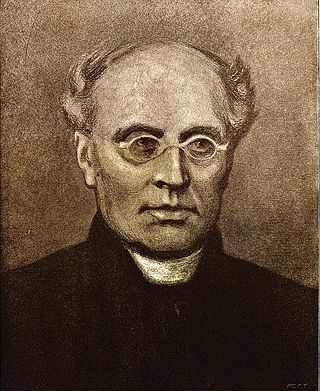
Johan Ludvig Runeberg was a Finnish priest, lyric and epic poet. He wrote exclusively in Swedish. He is considered a national poet of Finland. He is the author of the lyrics to Vårt land which became an unofficial Finnish national anthem. Runeberg was also involved in the modernization of the Finnish Lutheran hymnal and produced many texts for the new edition.

The Hietaniemi cemetery is located mainly in the Lapinlahti quarter and partly in the Etu-Töölö district of Helsinki, the capital of Finland. It is the location for Finnish state funeral services and is owned by the Evangelical Lutheran Church of Finland.
The Ryti–Ribbentrop letter of agreement was a personal letter from President of Finland Risto Ryti to German Führer Adolf Hitler signed on 26 June 1944. It was sent during the Soviet Vyborg–Petrozavodsk Offensive, which had started on 9 June and threatened to knock Finland out of the Continuation War.

Bernhard Henrik Crusell was a Swedish-Finnish clarinetist, composer and translator, "the most significant and internationally best-known Finnish-born classical composer and indeed, — the outstanding Finnish composer before Sibelius".

Frans Michael Franzén was a Swedish-Finnish poet and clergyman. He served as the Bishop of the Diocese of Härnösand.
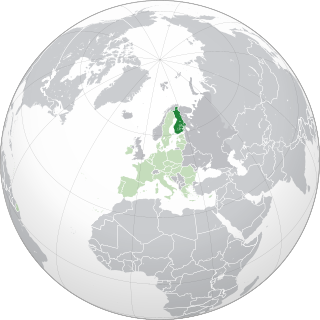
The history of the Jews in Finland goes back to the 1700s. Finnish Jews are Jews who are citizens of Finland. The country is home to some 1,800 Jews, of which 1,400 live in the Greater Helsinki area and 200 in Turku. Most Jews in Finland have Finnish or Swedish as their mother tongue, and many speak Yiddish, German, Russian and Hebrew. Jews originally came to Finland as Russian soldiers who stayed in Finland in the 19th century after their military service ended. There are Jewish congregations in Helsinki and Turku with their own synagogues built in 1906 and 1912. The Wiborg Synagogue built 1910–1911 was destroyed in air bombings during the first day of the Winter War in 30 November 1939. There has been relatively little antisemitism in Finland.

Magnus von Wright was a Swedish-Finnish painter and educator. In addition to bird illustrations, he was also known for his landscapes.
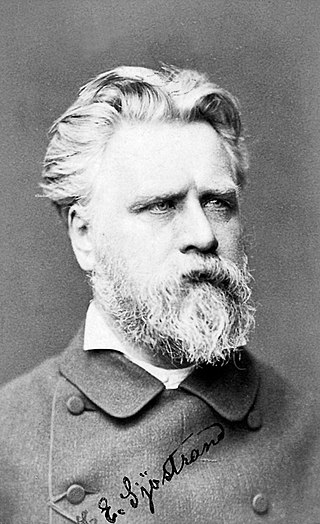
Carl Eneas Sjöstrand was a Swedish sculptor who worked for over 40 years in the Grand Duchy of Finland.

The Academic Male Voice Choir of Helsinki, abbreviated AS, colloquially also known as Akademen, is a Finland-Swedish academic male-voice choir in Helsinki, Finland. The choir was founded in 1838 by Fredrik Pacius and is the oldest extant choir in Finland. It is one of two male-voice choirs affiliated with the University of Helsinki, the other being the oldest extant Finnish-language choir, the YL Male Voice Choir. Furthermore, it is one of two Swedish-language choirs affiliated with the University of Helsinki, the other being the Academic Female Voice Choir Lyran.
Lilius is a Finnish family that descend from the bailiff Hans Rainenius, who lived in Satakunta. His son Vicar Henrik Rainenius-Lilius (1590–1657) together with his three sons where the first to adopt the surname Lilius.

Carl Henrik Wolter Ramsay was a Finnish politician and an economist from the Swedish People's Party. Ramsay is mostly remembered for the fact that he was sentenced in the war-responsibility trials in 1946.
Henrik Göran Casimir Ehrnrooth is a Finnish economist, manager and investor. He has been CEO and President at KONE since April 2014. Previously he served as KONE's CFO between 2009–2014. Prior to his career at KONE, he worked at Goldman Sachs from 1998–2009, most recently as a Managing Director in the Investment Banking Division and at UBS in various positions from 1994–1998. He studied at the University of Helsinki and the Hanken School of Economics and graduated from the latter in 1981.

Carl Fredrik Waldemar Meinander was a Finnish archaeologist and professor of Finnish and Scandinavian archaeology at University of Helsinki in Finland. His son is Professor Henrik Meinander.
Carl-Henrik Heldin is Chairman of the Board for the Nobel Foundation, and a molecular biologist and medical researcher. He has been director of the Uppsala branch of Ludwig Cancer Research since 1986 and professor in molecular cell biology at the medical faculty of Uppsala University since 1992. He is vice-president of the European Research Council since 2011 and was appointed chairman of the Nobel Foundation in 2013.

The Academic Female Voice Choir Lyran, also referred to as simply Lyran, is a Finland-Swedish academic female voice choir in Helsinki, Finland. It is the only women's choir affiliated with the University of Helsinki.
The Finland Prize is a literary award presented annually by the Swedish Academy since 1966. It is awarded to somebody that has done important activities for the Swedish-speaking culture in Finland. The amount was 100,000 crowns in 2007.
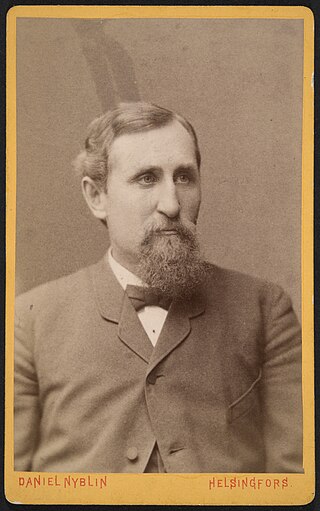
Frans Viktor Heikel was a Finland-Swedish gymnastics teacher, known as "the father of Finnish school gymnastics".
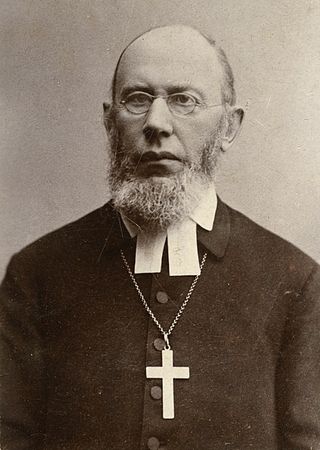
Carl Henrik Alopaeus was a Finnish Lutheran bishop and educator, known as the "apostle to the Deaf" due to his work in deaf education.
Schildts & Söderströms is a Finnish book publisher, which was established in February 2012 through a merger between Schildts Förlags Ab and Söderström & Co.














